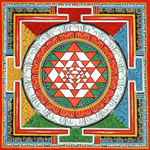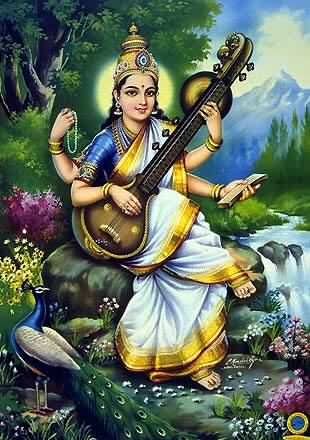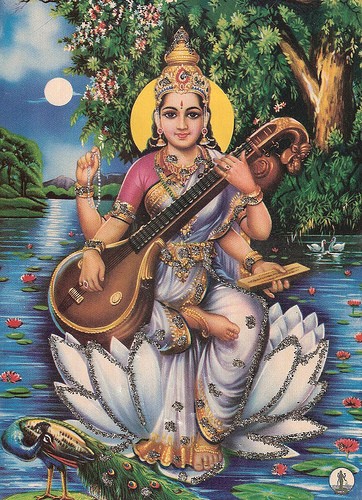

Goddess Studies
Bibliography,
Links, Guides, Resources
Advice for Living the Good Life
Alphabetical Index to the Cloud Hands Website
Cloud Hands Blog. By Mike
Garofalo. Online since 2005. A blog with
reflections, notes, suggestions, bibliographies, references, questions and answers, links and quotations about Gardening,
Yoga, Mysticism, Walking, Tai Chi, Chi Kung and The Eight Ways.
Goddess Inspirations
June 1, 2012
Maha Devi Shakti: Lakshmi, Druga, Kali, Parvati, The Mother
"Shakti (Devanagari:
शक्ति) from
Sanskrit shak – "to be able", meaning sacred force or
empowerment – is the primordial
cosmic energy and represents the dynamic forces that are thought to move
through the entire universe in
Hinduism.
Shakti is the concept, or personification, of divine
feminine
creative power, sometimes referred to as 'The Great
Divine Mother' in
Hinduism.
On the earthly plane, Shakti most actively manifests through female embodiment
and creativity/fertility, though it is also present in males in its potential,
unmanifest form. Not only is the Shakti responsible for creation, it
is also the agent of all change. Shakti is cosmic existence as well as
liberation, its most significant form being the
Kundalini
Shakti, a mysterious psychospiritual force. Shakti exists in a state of
svātantrya, dependence on no-one, being interdependent with the entire
universe. In
Shaktism,
Shakti is worshipped as the
Supreme Being. However, in other Hindu traditions of
Shaivism
and
Vaishnavism, Shakti embodies the active feminine energy
Prakriti of
Purusha, who is
Vishnu in
Vaishnavism or
Shiva in
Shaivism. Vishnu's female counterpart is called
Lakshmi, with
Parvati being
the female half of
Shiva."
- Shakti - Wikipedia
"Tantric philosophy also teaches that everything is to be experienced playfully, yet with awareness and a sense of sacredness in every gesture, every sensory perception, and every action. The path of Tantra is a spiritual one, which includes and appreciates the experience of our sexuality and sensuality as a conscious meditation, as a flowing together of the physical, erotic and cosmic energies.
If you were a devoted student of tantric philosophy, you would go through an extensive program of physical, sexual and mental exercises to heighten your sensory awareness."
- Tantric
Philosophy, White Lotus East
"In the Shaivite tradition, the god's companions (kaulas) are described as a troupe of freakish, adventurous delinquent and wild young people, who prowl in the night, shouting in the storm, singling, dancing and ceaselessly playing outrageous tricks on sages and gods. They are called Ganas, the 'vagabonds', corresponding to the Cretan Korybantes and the Celtic Korrigans (fairies' sons). Like the Sileni and Satyrs, some of them have goat's or bird's feet. The Ganas mock the rules of ethics and social order. The personify the joy of living, courage and imagination, which are all youthful values. They live in harmony with nature and oppose the destructive ambition of the city and the deceitful moralism which both hides and expresses it. These delinquents of heaven are always there to restore true values and to assist the 'god-mad' who are persecuted and mocked by the powerful. They personify everything which is feared by and displeases bourgeois society and which is contrary to the good morale of a well-policed city and its palliative concepts.'
- Shri Alain Daniélou, Shiva and Dionysus (reprinted as Gods of Love and
Ecstasy), p. 99
"Shaktism (Sanskrit:
Śāktaṃ, शाक्तं; lit., 'doctrine
of power' or 'doctrine of the Goddess') is a
denomination of
Hinduism
that focuses worship upon
Shakti or
Devi – the
Hindu
Divine Mother – as the absolute, ultimate Godhead. It is, along with
Shaivism
and
Vaisnavism, one of the primary schools of devotional Hinduism.
Shaktism regards Devī (lit., 'the Goddess') as the Supreme
Brahman
itself, the "one without a second", with all other forms of divinity, female or
male, considered to be merely her diverse manifestations. In the details of its
philosophy and practice, Shaktism resembles Shaivism. However, Shaktas
(Sanskrit:
Śākta, शाक्त), practitioners of
Shaktism, focus most or all worship on Shakti, as the dynamic feminine aspect of
the Supreme Divine.
Shiva, the masculine aspect of divinity, is considered solely
transcendent, and his worship is usually relegated to an auxiliary role.
The roots of Shaktism penetrate deep into India's prehistory.
From the Goddess's earliest known appearance in Indian paleolithic settlements
more than 22,000 years ago, through the refinement of her cult in the
Indus Valley Civilization, her partial eclipse during the
Vedic
period, and her subsequent resurfacing and expansion in the classical
Sanskrit tradition, it has been suggested that, in many ways, "the history of
the Hindu tradition can be seen as a reemergence of the feminine."
Over the course of
its history, Shaktism has inspired great works of
Sanskrit literature and
Hindu philosophy, and it continues to strongly influence popular Hinduism
today. Shaktism is practiced throughout the Indian subcontinent and beyond, in
numerous forms, both
Tantric and
non-Tantric; however, its two largest and most visible schools are the
Srikula (lit., family of
Sri), strongest in
South
India, and the Kalikula (family of
Kali), which
prevails in northern and eastern India."
- Shaktism
Kundalini Shakti Bhakti Mantra
Adi Shakti, Adi Shakti, Adi Shakti, Namo Namo!
Primal Shakti, I bow to Thee!
Sarab Shakti, Sarab Shakti, Sarab Shakti, Namo Namo! All
Encompassing Shakti, I bow to Thee!
Prithum Bhagvati, Prithum Bhagvati, Prithum Bhagvati, Namo Namo!
That through which Divine Creates, I bow to Thee!
Kundalini Mata Shakti, Mata Shakti, Namo Namo! Creative Power of
the Kundalini, Mother of all Mother Power, To Thee I bow!
Tantric Prayer
Obeisance to Her
Who is Pure Being, Consciousness, Bliss;
As Power,
Who Exists in the Forms of Time and Space
And All This is Therein,
Who is the Divine Illuminatrix in All Beings.
Prayer to Maha Devi Lakshmi
"I bow to you, O Mother of All Worlds, O Lotus Born, O Four-Armed Giver of Boons.
End
June 1, 2012
Maha Devi Shakti: Lakshmi, Druga, Kali, Parvati, The Mother
"May my insight be
unobstructed! May my knowledge prosper in textbooks, verses, magic books,
doctrinal books, and poems. So be it: mahaprabhave hili hili mili mili.
May it go forth for me by the power of the blessed goddess Sarasvati!
Karate keyure keyurabati hili mili hili mili hili hili."


Sophia: The Feminine Face of God: Nine Heart Paths to Healing and Abundance
By Karen Speerstra. Nine Heart Paths to Healing and Abundance.
Studio City, California, Michael Wise Productions, 2011. Index,
bibliography, 340 pages. ISBN: 9781611250046. VSCL.
Sophia: Goddess of Wisdom, Bride of God
By Caitlin Matthews. New Revised Edition. Wheaton, Illinois, Quest
Books, Theosophical Publishing House, 2001. Index, bibliography, notes,
430 pages. ISBN: 0835608018. VSCL.
Valley Spirit Yoga
Yoga Practice, Education, and Research
© 2003-2012, Green Way
Research, Red Bluff, California
Michael P. Garofalo, All Rights Reserved
Red Bluff, Tehama County, North Sacramento Valley, Northern California, U.S.A.
Cities and small towns in the area: Sacramento, Davis, Woodland, Vacaville,
Marysville,
Yuba City,
Williams, Colusa, Willows, Orland, Oroville, Paradise, Durham, Chico, Hamilton City,
Corning, Rancho Tehama, Los Molinos, Vina, Tehama, Proberta, Gerber, Red
Bluff,
Manton,
Cottonwood, Olinda, Cloverdale, Dairyville, Bend, Centerville, Summit City,
Anderson, Shasta Lake, Palo Cedro, Igo, Ono, Redding, Shasta,
Richfield, Fall River,
Montgomery Creek, Alturas, McCloud, Dunsmuir, Yreka, Happy Camp,
Shingletown, Burney, Mt. Shasta City, Weaverville, Chester,
Susanville,
Weed, Gridley, NorCalifia, CA, California.
This webpage was first published on the Internet on June 2, 2012.
This webpage was last modified or updated on August 14, 2014.